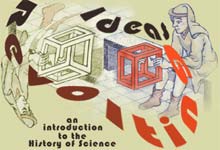
University of California, Irvine
Instructor: Dr. Barbara J. Becker

|
Week 1. Likely Stories excerpt from
|
Wilkins divided the universe into forty categories or classes, which were then subdivisible into differences, subdivisible in turn into species. To each class he assigned a monosyllable of two letters; to each difference, a consonant; to each species, a vowel. For example, de means element; deb, the first of the elements, fire; deba, a portion of the element of fire, a flame. In a similar language invented by Lentellier (1850) a means animal; ab, mammalian; abi, herviborous; abiv, equine; abo, carnivorous; aboj, feline; aboje, cat; etc. In the language of Bonifacio Sotos Ochando (1845) imaba means building; imaca, brothel; imafe, hospital; imafo, pesthouse; imari, house; imaru, country estate; imede, pillar; imedo, post; imego, floor; imela, ceiling; imogo, window; bire, bookbinder, birer, to bind books. (I found this in a book published in Buenos Aires in 1886: the Curso de lengua universal by Dr. Pedro Mata.)
The words of John Wilkins's analytical language are not stupid arbitrary symbols; every letter is meaningful, as the letters of the Holy Scriptures were meaningful for the cabalists. Mauthner observes that children could learn Wilkins's language without knowing that it was artificial; later, in school, they would discover that it was also a universal key and a secret encyclopedia.
After defining Wilkins's procedure, one must examine a problem that is impossible or difficult to postpone: the meaning of the fortieth table, on which the language is based. Consider the eighth category, which deals with stones. Wilkins divides them into the following classifications: ordinary (flint, gravel, slate); intermediate (marble, amber, coral); precious (pearl, opal); transparent (amethyst, sapphire); and insoluble (coal, clay, and arsenic). The ninth category is almost as alarming as the eighth. It reveals that metals can be imperfect (vermilion, quicksilver); artificial (bronze, brass); recremental (filings, rust); and natural (gold, tin, copper). The whale appears in the sixteenth category: it is a viviparous, oblong fish.
These ambiguities, redundances, and deficiencies recall those attributed by Dr. Franz Kuhn to a certain Chinese encyclopedia entitled Celestial Emporium of Benevolent Knowledge. On those remote pages it is written that animals are divided into
(a) those that belong to the Emperor,The Bibliographical Institute of Brussels also resorts to chaos: it has parceled the universe into 1,000 subdivisions: Number 262 corresponds to the Pope; Number 282, to the Roman Catholic Church; Number 263, to the Lord's Day; Number 268, to Sunday schools; Number 298, to Mormonism; and Number 294, to Brahmanism, Buddhism, Shintoism, and Taoism. It also tolerates heterogeneous subdivisions, for example, Number 179: "Cruelty to animals. Protection of animals. Moral Implications of duelling and suicide. Various vices and defects. Various virtues and qualities."
(b) embalmed ones,
(c) those that are trained,
(d) suckling pigs,
(e) mermaids,
(f) fabulous ones,
(g) stray dogs,
(h) those that are included in this classification,
(i) those that tremble as if they were mad,
(j) innumerable ones,
(k) those drawn with a very fine camel's hair brush,
(l) others,
(m) those that have just broken a flower vase,
(n) those that resemble flies from a distance.
I have noted the arbitrariness of Wilkins, of the unknown (or apocryphal) Chinese encyclopedist, and of the Bibliographical Institute of Brussels; obviously there is no classification of the universe that is not arbitrary and conjectural. The reason is very simple: we do not know what the universe is.... But the impossibility of penetrating the divine scheme of the universe cannot dissuade us from outlining human schemes, even though we are aware that they are provisional.....
| 1Anacolutha--n.,
pl. of anacoluthon; from Greek anakolouthon, meaning "inconsistency
in logic." A change from one grammatical construction to another
within the same sentence, sometimes used as a rhetorical device.
A sputtering sentence which shifts gears quickly. Ex.: "You
really ought--well, do it your own way!").
2Volapük--literally, "worldspeak" from vola meaning "of the world," and pük, a modification of the English word "speak." An invented language having a vocabulary based on roots from the major European languages and a complex morphology. Volapük was constructed about 1879 by J. M. Schleyer, a German clergyman, for proposed use as an international auxiliary language. 3Interlingua--term coined in 1908 by the Italian mathematician, Giuseppe Peano (1858-1932). An invented language based largely on languages derived from Latin and proposed for use as an international auxiliary language, especially in the scientific community. |
|